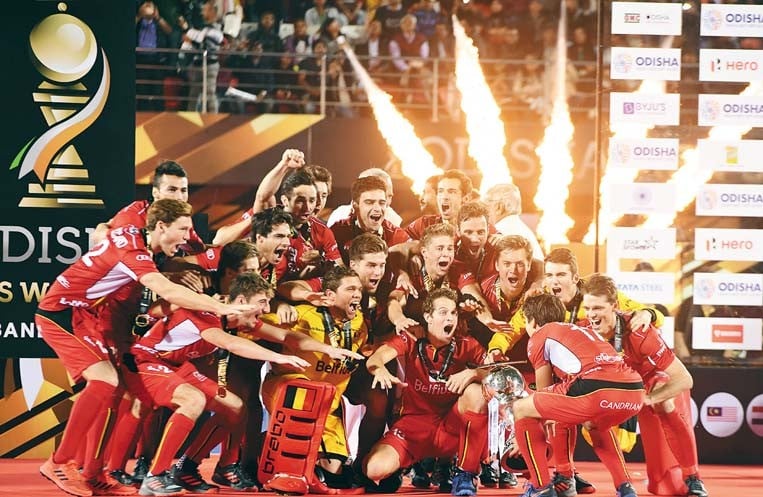
Belgium’s rise to the top of the world hockey has been an extraordinary journey

Belgium were the deserving winners at the 2018 Hockey World Cup. They were the silver medalists from the last Olympics and are now ranked No 1 in the FIH Rankings. Till a few years back, they were a non-entity on the international hockey circuit. It is almost unbelievable that Belgium had even failed to qualify for the 2006 and the 2010 World Cups.
When Belgium qualified for the 2008 Olympics, it was their first appearance since 1976. They finished that year ranked tenth, the highest position since the FIH rankings began in 2003.
At the junior level also, the transformation has been astounding; they were 11th at both the 2005 and the 2009 Junior World Cups.
What made all this possible? Marc Lammers, the former Dutch coach of Belgium says: "All this was step by step planning and proper execution. It was a conscious decision by the federation to overhaul the entire system, the facilities and the talent scouting."
Belgian system now resembles that of Holland. There is a strong club culture with the Belgian league running from September through May. Every Sunday, a league game is played and during the week, the players are together which keeps them match ready.
At the club, all the teams from under 14 to the senior squad, train and play with each other. Hence, there is one common system.
Many attribute this revolution to the arrival of a number of reputed Australian coaches towards the end of the last decade, in various roles and at different levels.
Adam Commens, a former player and coach at the Royal Antwerp Hockey Club (RAHC), was appointed the head coach of the national team in 2008.
Colin Batch, disappointed at not being appointed the head coach of Australian men’s team following Barry Dancer’s retirement, joined KHC Dragons as the head coach in 2009.
John Bessell, a former coach at the New South Wales Institute of Sport, took on the performance analysis role for the Royal Belgian Hockey Association in 2009 and the head coaching reigns at La Gantoise in 2010.
The same year, David Viner joined Royal Uccle Sport as the head coach.
Murray Richards, who had also played at RAHC since 2001, figured in a number of roles for various Belgian national sides: assistant coach of the national team, coach of the national under-21s, and coach of the Belgian women’s team.
They brought the "Australian way" -- pressing, fast counter-attacking and flair. The results first appeared at the club scene.
Colin Batch’s KHC Dragons caused the biggest upset of the Euro Hockey League in 2011 by defeating reigning champions Rot-Weiss Cologne of Germany before losing in the knockout round of 8.
The next year, the Dragons finished third in the EHL.
There were other factors too. For a small country, it was easy to carry out programmes whereby players could complete centralised training. Most players lived within a radius of one hour from the major centres of Brussels and Antwerp.
Quality coaches, Australians and others, refined skills and also imparted high performance knowledge and expertise to players as young as 14.
All this gradually enabled the national teams -- under-14s, under-16s, under-18s and under-21s -- to shine at the European events.
Belgium became a regular top-four team following a fourth-place finish in 2005, with a bronze medal in 2007 and two silver medals in 2013 and 2017.
Outside the continent, their first notable achievement was the maiden appearance at the Champions Trophy in 2012. Belgium appeared in the last four editions.
Before 2012, Belgium had been languishing in the FIH Champions Challenge 1, the next tier down from the Champions Trophy, winning in 2011 to get promotion to the 2012 Champions Trophy.
Colin Batch coached the national side from 2010 to 2012. He was replaced by Dutchman Marc Lammers. At the 2014 World Cup, Belgium, who had failed to qualify for the last two editions, finished 5th -- their best-ever finish until then. Lammers departed after the World Cup. His replacement was his assistant, Jeroen Delmee, also a Dutchman.
The first time Belgium made the hockey world acknowledge them as a major power was at the 2014-15 FIH Hockey World League finals where they finished second. That success ushered the most successful era of the Belgian hockey. In October 2015, New Zealander Shane McLeod became the head coach and is still there.
Individual awards also began coming their way. In 2016 Dohmen was named world player of the year and Arthur Van Doren was named young player of the year.
There has been no looking back. Silver arrived at the 2016 Olympics. In 2017 Van Doren was named player of the year and young player of the year, becoming the first player to achieve the two awards in one year. Vincent Van Asch was named the goalkeeper of the year.
Finally, the biggest prize arrived in 2018. Arthur Van Doren was the Player of the Tournament and Alexander Hendrikx was the joint top scorer.
It was a historic occasion for a nation of 10 million -- it was their first-ever world title in a team sport.
The Red Lions were given a heroes’ welcome home. After arriving at the Brussels airport, the team was taken to the Royal Place where they were congratulated by King Filip and Queen Mathilde. Next was the Brussels Town Hall where thousands of fans gathered to hail the World Champions.
The fabulous rags to riches story which culminated at Bhubaneswar qualifies as a case study for any nation aspiring for success in any team sport.
ijaz62@hotmail.com